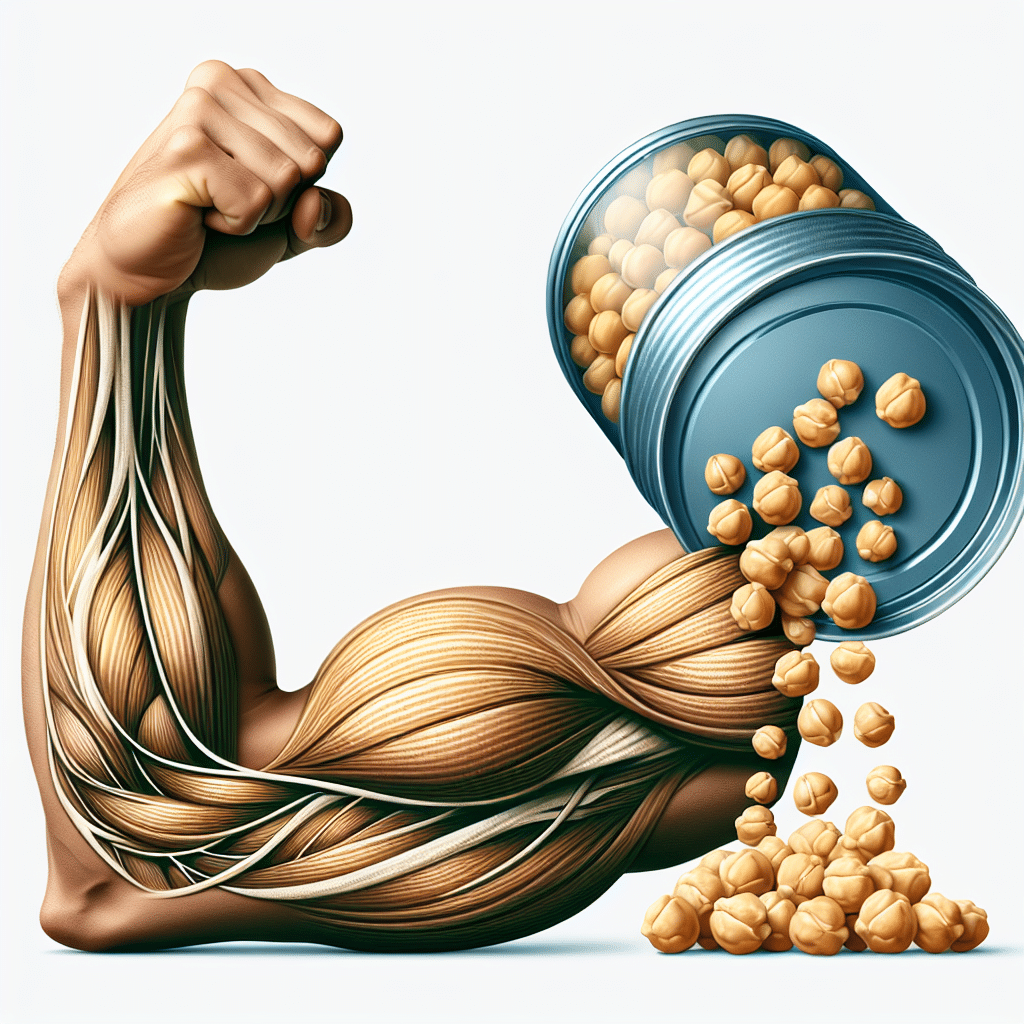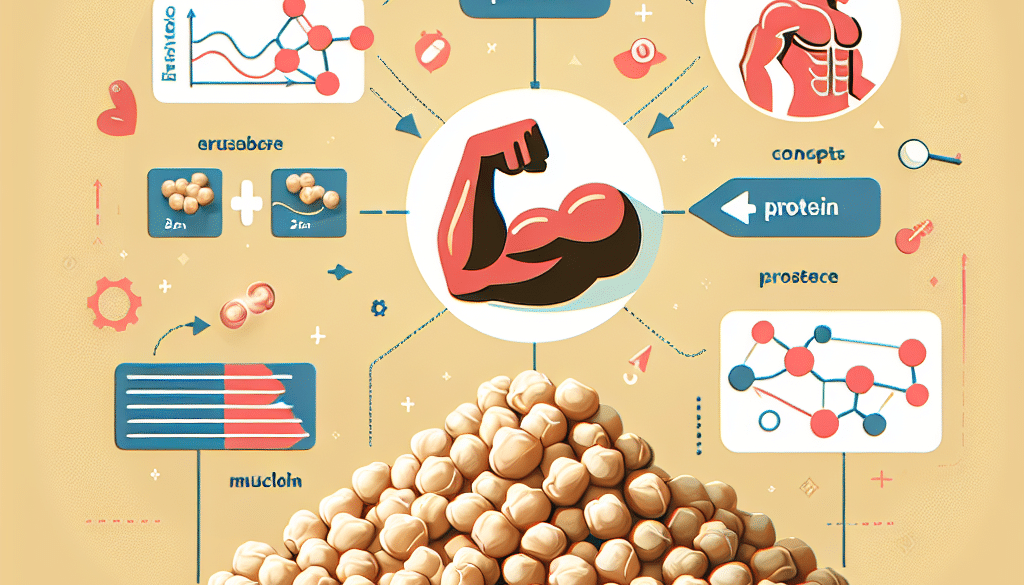Do Chickpeas Have Protein For Muscle Gain?
-
Table of Contents
- Chickpeas for Muscle Gain: A Protein Powerhouse?
- Understanding Protein and Muscle Synthesis
- Chickpeas: Nutritional Profile and Protein Content
- Chickpeas and Muscle Gain: What Does the Research Say?
- Incorporating Chickpeas into a Muscle-Building Diet
- Comparing Chickpeas to Other Protein Sources
- Conclusion: The Role of Chickpeas in Muscle Gain
- ETprotein: Your Source for High-Quality Protein Products
Chickpeas for Muscle Gain: A Protein Powerhouse?

When it comes to building muscle, protein is the cornerstone of diet planning. Fitness enthusiasts and bodybuilders alike scour the nutritional landscape for the best sources of protein. Among the plethora of options, chickpeas have emerged as a popular plant-based alternative. But do chickpeas truly have the protein necessary for muscle gain? This article delves into the nutritional profile of chickpeas, their role in muscle synthesis, and how they compare to other protein sources.
Understanding Protein and Muscle Synthesis
Before we explore chickpeas as a protein source, it’s essential to understand the role of protein in muscle gain. Protein is made up of amino acids, which are the building blocks of muscle tissue. When you exercise, especially during resistance training, you create micro-tears in your muscle fibers. Protein helps repair these tears, which in turn leads to muscle growth.
For optimal muscle synthesis, a diet must provide all nine essential amino acids. These cannot be produced by the body and must be obtained through food. Complete proteins contain all nine essential amino acids in sufficient quantities, while incomplete proteins lack one or more of these amino acids.
Chickpeas: Nutritional Profile and Protein Content
Chickpeas, also known as garbanzo beans, are a legume that has been a staple in Middle Eastern, Mediterranean, and South Asian cuisines for centuries. They are not only rich in protein but also in fiber, vitamins, and minerals.
- Protein: Chickpeas contain about 15 grams of protein per cup (cooked), making them a significant source of plant-based protein.
- Fiber: With roughly 12.5 grams of dietary fiber per cup, chickpeas can aid in digestion and help maintain a feeling of fullness.
- Vitamins and Minerals: Chickpeas are a good source of folate, iron, phosphorus, and magnesium, among other nutrients.
While chickpeas are high in protein, they are considered an incomplete protein because they lack certain essential amino acids, such as methionine. However, when paired with other foods like whole grains, they can provide a complete protein profile.
Chickpeas and Muscle Gain: What Does the Research Say?
Research on plant-based proteins for muscle gain is growing. A study published in the American Journal of Clinical Nutrition found that plant protein can build muscle just as well as animal protein when consumed in adequate amounts. Chickpeas, with their high protein content, can contribute to this muscle-building process.
However, it’s important to note that the protein in chickpeas is less bioavailable than that found in animal products. This means that the body may not absorb and utilize it as efficiently. To counteract this, it’s recommended to consume a higher quantity of plant-based proteins like chickpeas to meet muscle-building needs.
Incorporating Chickpeas into a Muscle-Building Diet
Chickpeas can be a valuable addition to a muscle-building diet, especially for vegetarians and vegans. Here are some ways to incorporate them into your meals:
- As a main dish: Use chickpeas as the protein base in salads, stews, and curries.
- In snacks: Roasted chickpeas can be a crunchy, protein-rich snack.
- As flour: Chickpea flour can be used in baking or to make protein-packed pancakes.
- In smoothies: Blend chickpeas into smoothies for an extra protein boost.
By combining chickpeas with other protein sources, such as grains, nuts, and seeds, you can ensure a complete amino acid profile and support muscle growth.
Comparing Chickpeas to Other Protein Sources
When compared to other protein sources, chickpeas hold their own, particularly within the plant-based category. For example, one cup of cooked lentils provides about 18 grams of protein, while a cup of cooked quinoa offers around 8 grams. Animal-based proteins, such as chicken breast, contain about 31 grams of protein per cup.
While chickpeas may not have as much protein per serving as some animal products, they offer additional health benefits such as fiber, which is absent in animal proteins. This makes chickpeas a well-rounded food choice for those looking to gain muscle while also maintaining overall health.
Conclusion: The Role of Chickpeas in Muscle Gain
Chickpeas are a nutritious, protein-rich food that can play a role in muscle gain. While they may not be a complete protein on their own, they can be easily combined with other foods to provide all the essential amino acids needed for muscle synthesis. For those following a plant-based diet or looking to diversify their protein sources, chickpeas are an excellent option.
It’s important to remember that muscle gain is not solely dependent on protein intake. A balanced diet, adequate caloric intake, and a well-structured exercise regimen are all crucial components of muscle growth. Chickpeas can be part of this balanced approach, contributing to a healthy and effective muscle-building diet.
ETprotein: Your Source for High-Quality Protein Products
If you’re looking to supplement your diet with additional protein, ETprotein offers a range of organic bulk vegan proteins that can complement your chickpea intake. Their products, including pea protein, rice protein, and various seed proteins, are non-GMO, allergen-free, and feature a neutral taste, making them an ideal addition to any muscle-building diet.
ETprotein’s offerings cater to various industries and dietary needs, ensuring that you can find the right protein solution for your muscle gain goals. With their commitment to quality and customer satisfaction, ETprotein is a reliable choice for those seeking to enhance their protein intake with plant-based options.
About ETprotein:
ETprotein, a reputable protein and L-(+)-Ergothioneine (EGT) Chinese factory manufacturer and supplier, is renowned for producing, stocking, exporting, and delivering the highest quality organic bulk vegan proteins and L-(+)-Ergothioneine. They include Organic rice protein, clear rice protein, pea protein, clear pea protein, watermelon seed protein, pumpkin seed protein, sunflower seed protein, mung bean protein, peanut protein, and L-(+)-Ergothioneine EGT Pharmaceutical grade, L-(+)-Ergothioneine EGT food grade, L-(+)-Ergothioneine EGT cosmetic grade, L-(+)-Ergothioneine EGT reference grade and L-(+)-Ergothioneine EGT standard. Their offerings, characterized by a neutral taste, non-GMO, allergen-free attributes, with L-(+)-Ergothioneine purity over 98%, 99%, cater to a diverse range of industries. They serve nutraceutical, pharmaceutical, cosmeceutical, veterinary, as well as food and beverage finished product distributors, traders, and manufacturers across Europe, USA, Canada, Australia, Thailand, Japan, Korea, Brazil, and Chile, among others.
ETprotein specialization includes exporting and delivering tailor-made protein powder and finished nutritional supplements. Their extensive product range covers sectors like Food and Beverage, Sports Nutrition, Weight Management, Dietary Supplements, Health and Wellness Products, and Infant Formula, ensuring comprehensive solutions to meet all your protein needs.
As a trusted company by leading global food and beverage brands and Fortune 500 companies, ETprotein reinforces China’s reputation in the global arena. For more information or to sample their products, please contact them and email sales(at)ETprotein.com today.












